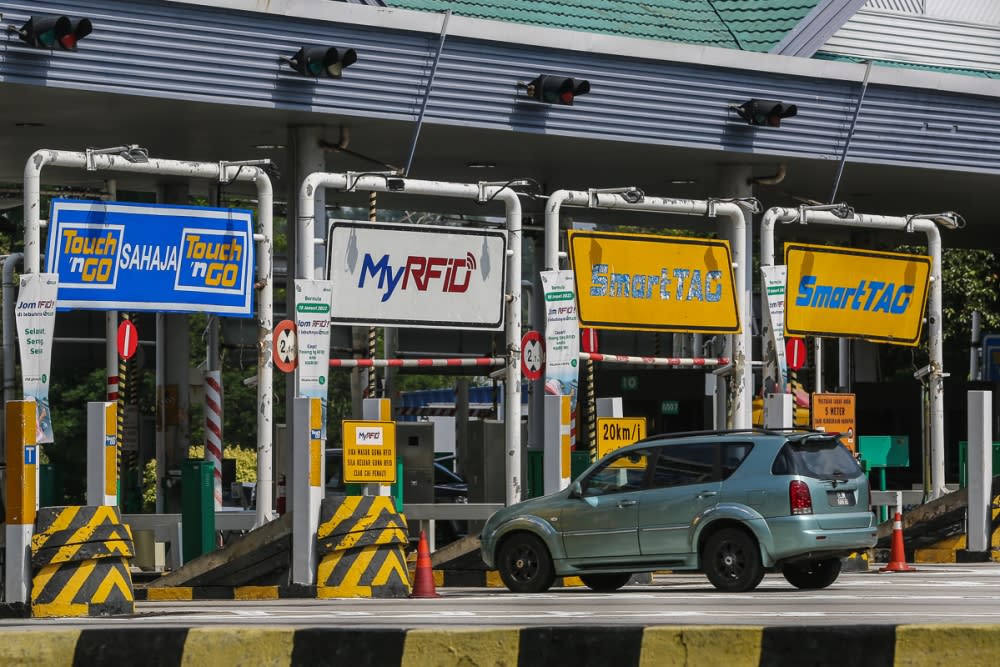Five highways to support card payments: what’s next for multi-lane-free-flow plan?

KUALA LUMPUR, March 21 — Works Minister Alexander Nanta Linggi has announced that Malaysia will fully implement Multi-Lane-Free-Flow (MLFF) for highway tolls by Q3 2024. As a first step towards the implementation, he said five identified highways will adopt an open payment system by September 2023 which will allow users to use their credit and debit cards to pay for tolls.
The 5 highways that will support credit and debit card payments by September 2023 are:
Sungai Besi Expressway (Besraya)
New Pantai Expressway (NPE)
Ampang-Kuala Lumpur Elevated Highway (AKLEH)
Guthrie Corridor Expressway (GCE)
Penang Bridge
The minister also said a Proof of Concept (POC) for MLFF will be conducted before the end of October 2023 to evaluate the MLFF system before it is implemented for all highways in Malaysia. The location of the POC is still in discussion and it will be finalised soon.
He added that with the implementation of an open payment system for toll collection, there will be greater opportunity for more eWallet providers to participate and there’s no more monopoly by Touch ‘n Go. Since MLFF is a barrier-free experience with no physical barriers, the toll payments will have to be done automatically instead of relying on physical terminals for users to tap. Allowing users to tap their credit and debit cards at the toll booth defeats the purpose of MLFF and it takes a longer time to authenticate credit/debit card payment versus a stored-value card like Touch ‘n Go.
Although RFID is not mentioned, the open payment system is highly likely to be linked to RFID. The question remains if the government will continue with Touch ‘n Go RFID or other alternative RFID solutions.
Open Payment has been promised since 2019
An Open Payment system for toll payments has been long overdue. Back in 2019, both CIMB and Touch ‘n Go announced that an open payment facility will be introduced, which will allow users to link the RFID tag to a total of four cashless payment options such as bank accounts, credit cards and debit cards.
At the time, Datuk Seri Zafrul Aziz, who was the former Group CEO of CIMB Group said, “The democratisation in toll payments is something we fully champion and the CIMB teams, together with the teams at our subsidiary TNG, are committed to collaborating with PLUS and, in time, other highway concessionaires to make open payments an accessible reality for all Malaysians.”
In case you didn’t know, PLUS introduced its own RFID system with a public pilot test at four toll plazas in 2018. Unlike TNG RFID, PLUS RFID uses an open payment system which allowed users to link their preferred debit or credit card. As a result, there’s no longer a need to top up and maintain a separate eWallet. Unfortunately, PLUS RFID was discontinued after CIMB had taken legal action alleging that PLUS RFID violated a joint venture agreement on toll payment collection that was signed over 20 years ago.
Today, Touch ‘n Go remains the default payment option which includes the physical TNG card (both TNG and SmartTAG Lane) as well as TNG eWallet for RFID.
Things that need to be addressed before MLFF is implemented
Before the barriers can be removed from toll plazas, the Malaysian government has to address several issues which include potential leakage due to toll evaders. Vehicles that pass through an overhead tolling gantry may not have an RFID tag and there’s also the scenario of RFID users that don’t have a valid payment or have insufficient funds.
Highway concessionaires want to be assured that they can collect tolls effectively through a comprehensive legal framework. For example, if a vehicle doesn’t have an RFID tag, the driver will be given a grace period to settle the outstanding tolls. If a toll is not paid on time, a fine can be issued and eventually legal action can be taken to recover the outstanding amount owed including the penalty charges.
Automated Number Plate Recognition (ANPR) is a key component to enforcing toll payments in an MLFF scenario to detect vehicles that don’t have valid payments. The biggest problem is the usage of fancy plates which poses a challenge to catching toll evaders. This is where the Transport Ministry and the Land Transportation Department need to step up their enforcement to ensure all vehicles are fitted with standardised plates for better recognition.
Yesterday, Transport Minister Anthony Loke announced that he has instructed Prasarana and KTM Berhad to adopt an open payment system for their train and bus networks. This will allow users to pay for public transport with their credit and debit cards, in addition to Touch ‘n Go.
He said that the implementation will take some time as the operators will need to integrate the system.
On Sunday, Prime Minister Anwar Ibrahim was asked by a youth about the current problematic Touch ‘n Go situation. Anwar said Touch ‘n Go has been in operation for more than two decades and there has not been convincing development or progress in the system. He agreed with the youth and said the government will reconsider Touch ‘n Go’s monopoly for highway tolls and public transport. — SoyaCincau



